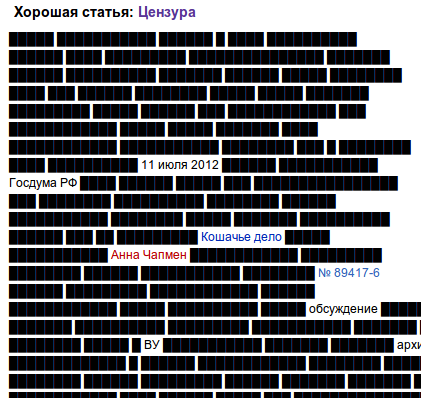Rick Falkvinge's Blog, page 34
November 13, 2012
Russian Government Kills Russian Wikipedia Clone “To Protect Children”

Repression: This Monday, the Russian Government placed a Russian Wikipedia clone on a censorship blacklist. The Russian Government maintains such a kill switch for “harmful sites” – motivated with protecting children from drug use, child porn, or suicide methods. In reality, as usual, give anybody such a switch and they’ll shut off things they plain don’t like.
The Russian Wikipedia clone Lurkomore (Луркоморье) has long been a Wikipedia-on-steroids in Russia. With the notability requirement for articles relaxed, Lurkomore had become an “encyclopedia of contemporary culture, folklore, and subcultures, as well as everything else”.

A plug for the article on “censorship”. The site is not without humor.
As reported by Russian news site Lenta, the site went gradually offline in the evening of November 11. The Russian government can ban any website without warning for promotion of drug use, child porn, or suicide. In this case, it was the Russian anti-drug agency who took the entire encyclopedia – the entire encyclopedia – offline in the name of “protecting children”.
(In case you’re wondering, this is textbook censorship. Not the name-calling kind; the literal kind where a government prevents publication of information between consenting parties.)
Previously, the entire Russian version of Uncyclopedia was similarly censored for its humorous satire article named How to commit suicide (“Suicide is illegal in most countries. People have recently been arguing for the death penalty as the punishment for committing suicide.”) The article was later removed.
The Lurkomore site has since moved to another IP address, bypassing the IP blacklist completely.
Hat tip to @sult.

November 11, 2012
How The Copyright Industry Drives A Big Brother Dystopia

Infopolicy: All too often, I hear that the copyright industry doesn’t understand the Internet, doesn’t understand the net generation, doesn’t understand how technology has changed. This is not only wrong, it is dangerously wrong. In order to defeat an adversary, you must first come to understand their state of mind, rather than painting them as evil. The copyright industry understands exactly what the Internet is, and that it needs to be destroyed for that industry to stay even the slightest relevant.
Look at the laws being proposed right now. General wiretapping. Mandatory citizen tracking. Excommunication, for Odin’s sake. Sending people into exile. All these laws follow one single common theme: they aim to re-centralize the permission to publish ideas, knowledge, and culture, and punish anybody who circumvents the old gatekeepers’ way beyond proportion.
Having this gatekeeper position – having had this gatekeeper position – teaches somebody what power is, in the worst sense of the word. If you can determine what culture, knowledge, and ideas are available to people – if you are in a position to say yes or no to publishing an idea – then it goes much beyond the power of mere publishing. It puts you in a position to select. It puts you in a position where you get to decide people’s frame of reference. It literally gives you the power to decide what people discuss, feel, and think.
The ability to share ideas, culture, and knowledge without permission or traceability is built into the foundations of the net, just as it was when the Postal Service was first conceived. When we send a letter in the mail, we and we alone determine whether we identify ourselves as sender on the outside of the envelope, on the inside for only the recipient to know, or not at all; further, nobody may open our sealed letters in transit just to check up on what we’re sending.
The Internet mimics this. It is perfectly reasonable that our children have the same rights as our parents did here. But if our children have those same rights, in the environment where they communicate, it makes a small class of industries obsolete. Therefore, this is what the copyright industry tries to destroy.
They are pushing for laws that introduce identifiability, even for historic records. The copyright industry has been one of the strongest proponents of the Data Retention Directive in Europe, which mandates logging of our communications – not its contents, but all information about whom we contacted when and how – for a significant period of time. This is data that used to be absolutely forbidden to store for privacy reasons. The copyright industry has managed to flip that from “forbidden” to “mandatory”.
They are pushing for laws that introduce liability on all levels. A family of four may be sued into oblivion by an industry cartel in a courtroom where presumption of innocence doesn’t exist (a civil proceeding), and they’re pushing for mail carriers to be liable for the contents of the sealed messages they carry. This goes counter to centuries of tradition in postal services, and is a way of enforcing their will extrajudicially – outside the courtroom, where people still have a minimum of rights to defend themselves.
They are pushing for laws that introduce wiretapping of entire populations – and suing for the right to do it before it becomes law. Also, they did it anyway without telling anybody.
They are pushing for laws that send people into exile, cutting off their ability to function in society, if they send the wrong things in sealed letters.
They are pushing for active censorship laws that we haven’t had in well over a century, using child pornography as a battering ram (in a way that directly causes more children to be abused, to boot).
They are pushing for laws that introduce traceability even for the pettiest crimes, which specifically includes sharing of culture (which shouldn’t be a crime in the first place). In some instances, such laws even give the copyright industry stronger rights to violate privacy than that country’s police force.
With these concepts added together, they may finally – finally! – be able to squeeze out our freedom of speech and other fundamental rights, all in order to be able to sustain an unnecessary industry. It also creates a Big Brother nightmare beyond what people could have possibly imagined a decade ago. My undying question is therefore why people waltz along with it instead of smashing these bastards in the face with the nearest chair.
For instance, we hear that ISPs in the United States of America will start to serve the copyright industry in the treatment of its own customers, up until and including a possible exile of them as citizens, and most likely scrapping their right to anonymity for the already-going industry game of sue-a-granny.
This is bound to become a textbook example of bad customer relationships in future marketing books: making sure that your customers can be sued into oblivion by entire industry organizations in a rigged game where they’re not even innocent until proven guilty. Seriously, what were the ISPs thinking?
Today, we exercise our fundamental rights – the right to privacy, the right to expression, the right to correspondence, the right to associate, the right to assemble, the right to a free press, and many other rights – through the Internet. Therefore, anonymous and uncensored access to the Internet has become as fundamental a right itself as all the rights we exercise through it.
If this means that a stupid industry that makes thin round pieces of plastic can’t make money anymore, they can go bankrupt for all I care, or start selling mayonnaise instead.
That’s their problem.
This column was originally published at TorrentFreak.

Privacy: The Political Divider

Privacy – Henrik Alexandersson: Privacy issues are political dividers. Either you take the classical liberal stand – that citizens are individuals, who should be judged by their actions, or you choose a socialist or conservative stand – where citizens are to be seen and treated as a collective.
Almost no one denies the need for surveillance when it comes to people who are suspected of serious crimes (or obvious preparation of such crimes).
The issue is if you want surveillance of all citizens, all the time. Just in case.
The public Big Brother discourse seems to focus on things like terrorism, drug cartels, human trafficking, sexual abuse of children, public order, and similar alarming issues.
But the justification for surveillance has nothing to do with the approach to it as such. Everything can be excused. Practically everything.
We cannot draw the line on a case-by-case basis, as the boundaries of what our elected representatives deems to be acceptable or not keeps changing depending on time, zeitgeist and place. There are no guarantees that the ruling classes will use surveillance for reasonable purposes only, at all times.
We must draw a line that stands on principle.
Surveillance should only be used if there is a tangible suspicion of a crime being committed, or about to be committed.
When this principle is established – but no earlier – you can take on the day-to-day discussion about what should be legal and illegal. That is a neverending and ever-changing process.
We must accept and respect the right to privacy as a fundamental human right.
Today’s day-by-day and case-by-case approach will, with absolute certainty, lead to the right to privacy being hollowed out altogether. You need only give politics a glance to understand that.
A society without the right to privacy will be a highly unpleasant, hostile and dangerous society. Especially for the innocent.
We, the people, must demand our right to privacy back. Because no one else will do it for us.
Originally posted at The Embedded Citizen and at Hax’ private blog in Swedish.

November 10, 2012
Copyright Industry Madness Takes Six Years To Catch Up With The Worst Satire Of It

Privacy: Six years ago, a satire site wrote a story about how the copyright industry wanted more money if you invited friends to watch a movie in your living room. This notion has now been patented in new technology: automated headcounts coming to a living room near you, to enable new forms of restrictions. Apparently, the copyright industry takes six years to catch up with the very worst satire of it.
In November 2006, a site named BBSpot wrote a story about how the MPAA lobbied for home theater regulations, arguing that a home theater in your living room allows your friends to not buy their own DVD:
“Just because you buy a DVD to watch at home doesn’t give you the right to invite friends over to watch it too. That’s a violation of copyright and denies us the revenue that would be generated from DVD sales to your friends,” said [MPAA spokesman] Glickman.
At the time, this was a hilarious satire of the greed and creepy pushiness of the copyright industry. It felt like the famous “20 minutes into the future” – meaning just around the corner. Turns out that was right on the money; Microsoft has now filed for a patent monopoly where their Kinect device counts how many people are watching a movie, and prevents the movie from being played if too many people are watching it.
Yes, you read that right.
Mashable writes;
Microsoft has filed a patent for a technology that would let Kinect detect how many people are consuming content at a given time [...] would monitor how many people are in the room when a game or piece of entertainment is being displayed and “take remedial action” if the number of user-views licensed is exceeded, according to the patent application.
So be careful when you write satire about the madness and delusions of the copyright industry (and that certainly isn’t hard – more often than not, ordinary journalism will do fine). Either tread very carefully, or start a little stopwatch the next time you publish satire about what that parasitic, shameless industry will think of next.
My prediction would be on connecting face recognition to this, so that the license-purchasing person has to be verifiably present in the living room for a particular movie to play using the copyright industry’s methods. (In the meantime, assorted Asian companies sell media players that play MKV files straight off a file share without any of this bullshit.)
UPDATE: As pointed out in comment 7, this satire article six years ago may actually count as so-called prior art, invalidating Microsoft’s patent monopoly filed six years after it. The satire article even mentions the same methods and means (motion detectors) as the Microsoft filing.

November 7, 2012
Obama’s Second Term: The Battle For Digital Rights Continues

Activism – Wendy Cockcroft: As Democrats and moderate conservatives like myself rejoice that Mitt Romney didn’t get a chance to wreck America again as Bush Administration II, let’s take some time to look at what might have been, what’s yet to come, and what we’re going to do about it.
There is no doubt in my mind that a Romney win would have been a disaster for America. He had picked many members of the same team for his cabinet as G.W. Bush had for his, and they were pushing the same policies, namely tax cuts for the rich and a huge increase in military spending. Mitt’s mate John Lehman had even set the wheels in motion for a fleet of new war ships for the navy, even though invasive land wars are increasingly becoming obsolete. Needless to say, he would have made a mint (again!) from plundering the public purse in the name of protecting the nation by providing it with items it simply doesn’t need. Fiscally prudent? Pull the other leg, it’s got bells on!
What’s coming
Americans are preoccupied with the fiscal cliff, when the stimulus and the Bush era tax cuts come to an end. Apparently, this is a good thing because Congress is going to have to work with the President this time around in order to avoid a new recession caused by a sudden increase in taxes and cuts in spending. Since they can’t deny him a third term due to term limits, they’ve got nothing to lose by working with him to sort out the economy this time around. Don’t count on it, though. Many of the far right Congressmen and women have been voted back into office and we’re stuck with them till the mid term elections.
The Republican Party will hopefully implode and be replaced by reasonable representatives. This needs to happen because people who ignore facts they find inconvenient are neither amenable to reason nor open to persuasion. If we’re going to get the changes we want, we need progressives and moderates to effect the changes in the laws that maintain the copyright and patent monopolies that are stifling innovation by restricting it to those who hold the most broadly-written registration documents. The rightward march of American politics has denied the public interest as a collectivist/progressive/left wing (and therefore easily dismissed) issue. Since the libertarian-right wing of the Republican Party is all about extending and enforcing property rights as a bastion of freedom, they were happy to attach those values to notions of ideas as property, which created the tropes of intellectual property, usage as consumption, and infringement as theft. It’s a waste of time to try to explain to them how things were before and how they have changed even in the last thirty years because they dismiss contradictions of their political narrative as liberal fiction (so they’re not obliged to pay any attention to or engage with it) and they don’t appreciate “interference” from outsiders, i.e. non-Americans like me. We’ve still got a Republican Congress, though, and they still think like that. If the party implodes, we might be able to reason with whoever is still standing afterwards. It’ll probably be the mid-term elections when Congressional elections are held again that we’re able to effect the changes we want in US law where notions of property rights over creative output are concerned.
What do we do?
There’s also the matter of digital freedom to consider. Efforts to put us all under surveillance to protect us from the Four Horsemen of the Infocalypse are ongoing, not to mention censorship and the plan to enact a quasi-religious authoritarian global internet regime. This is being attempted from multiple directions, including trade agreements, domestic laws, and ISP policy changes as part of a “voluntary” code. Net neutrality and reform of those laws that are usually deliberately bundled together by lobbyists as “intellectual property” are high on the list of what we need to achieve. Momentum and the weight of history is on our side. Internet and real life activism has brought down SOPA, PIPA, CISPA, ACTA, and the Cybersecurity Act 2012. Other unfair laws have been kicked into touch or revised, including censorship efforts in Arizona, USA, and the Philippines. There is much to be done and if we have the will and the numbers to do it, we will prevail.

November 6, 2012
The Analog Letter: It’s Entirely Reasonable To Demand That Our Children Inherit The Rights Of Our Parents

Copyright Monopoly: Whenever pirates demand the right to send anything to anybody without being tracked, we are somehow accused of wanting things for free. That’s not true. What we demand is simpler: we demand the laws to apply equally online and offline; we demand that our children inherit the civil liberties that our parents fought, bled and often died to give to us. It’s an entirely reasonable demand.
Let’s look at the classic letter to illustrate this. The physical letter, consisting of an envelope, a folded paper with writing on it inside the envelope, and a stamp. This was what personal communication looked like in our parents’ offline world, and it was enshrined with certain civil liberties. I’m going to focus on four of them.
First, the letter was anonymous. You, and you alone, determined whether you identified yourself as sender on the outside of the envelope for the world to know, on the inside of the letter for only the recipient to know, or didn’t identify yourself at all when sending a letter. This was your prerogative.
Second, the letter was secret in transit. Nobody had the right to open all letters just to make sure they didn’t contain something illegal or immoral – or something copied, for that matter. If you were under prior suspicion of a very serious crime, your mail could be secretly opened to find evidence of that crime – but no letter would ever be opened routinely to check for new crimes.
Third, the letter was untracked. Nobody had the right – nor, indeed, the capability – to record who was communicating with whom. Nobody was able to monitor all mailboxes to see when somebody dropped a letter in it, much less the ability to identify that person and connect them to the address on the letter dropped in the mailbox. It was a fundamental right to keep your connections to yourself.
Fourth, the mailman was never responsible for the contents in the sealed letter. How could they? They were not aware of its contents, nor were they allowed to make themselves aware of its contents. Their responsibility and accountability started and ended with delivery of the packages to the address on the envelope.
This is a set of civil liberties that our parents and grandparents literally fought, bled, and sometimes even died to give us. It is entirely reasonable that they carry over to our children in the environment they communicate in, just as the rights applied to the offline world of our parents.
But when you point this out, some will protest loudly. The copyright industry, in particular. “If you allow anybody to send anything to anybody else, even anonymously, we can’t make any money!”
To this, I respond, so what?
It is the job of every entrepreneur to make money given the current constraints of society and technology. Nobody gets to dismantle civil liberties just because they can’t make money otherwise – and perhaps especially if they can’t make money otherwise.
If a particular industry can’t continue to make money the same way in the face of sustained civil liberties, they get to go out of business or start selling something else. We don’t determine what civil liberties our children get based on who can make money and who can’t; we base them on what our parents fought and bled for.
This is the heart of the file-sharing debate. I don’t care a millisecond if an obsolete distribution industry goes out of business, but I do care about the civil liberties that our children deserve to inherit.
This article has previously been published on TorrentFreak.

November 5, 2012
Iowa, Ohio and Texas Take Stand Against Transparent Elections

Civil Liberties – Andrew Norton: If you’ve ever heard something like ‘America is the greatest democratic country in the world’ take heed. While many believe that to be the case, the State Governors of both Iowa and Texas are afraid to put that to the test. They’ve threatened independent election inspectors with Jail. That’s right, the supposed shining beacon of democracy is afraid of scrutiny.
Yes, you read that right, the Governor and Secretary of State for a US state, has threatened to arrest independent election monitors for monitoring perhaps the highest-stakes election of the times.
Earlier this week, State officials from Iowa threatened independent international election monitors with arrest if they attempted to monitor voting in that state next week. On Tuesday, November 6, voters across the US will go to the polls to elect members of the house, Senate, and local elections, but it’s the Presidential race that has been the focus of all attention in recent months.
Nor is Iowa alone. A week earlier, Texas Attorney General Greg Abbott made a similar statement about international monitors there. Texas has a long history of voter suppression, and as such is covered by Section 5 of the Voting Rights Act, requiring it to get ‘preclearance’ from the Federal Department of Justice, before changing anything voting-related.
In his letter, Abbott states
Elections and election observation are regulated by state law. The Texas Election Code governs anyone who participates in Texas elections—including representatives of the OSCE. The OSCE’s representatives are not authorized by Texas law to enter a polling place. It may be a criminal offense for OSCE’s representatives to maintain a presence within 100 feet of a polling place’s entrance. Failure to comply with these requirements could subject the OSCE’s representatives to criminal prosecution for violating state law.
You do have to wonder what he’s afraid of.
To top it off, he announced it with a tweet
UN poll watchers can’t interfere w/ Texas elections. I’ll bring criminal charges if needed. Official letter posted soon. #comeandtakeit
— Greg Abbott (@GregAbbott_TX) October 23, 2012
Of course, he’s a bit mistaken, as OSCE isn’t a UN org, any more than NATO is. Both are ‘chapter 8 organisations’ but that’s as far as it goes. That didn’t stop the ignorant commenting on the story on various republican news sites talking about attacking, evicting, or going to war with the UN.
Meanwhile, Iowa has it’s own problems. As one of the ‘swing states’ it’s one of the most hotly contested areas of the US, where presidential campaigns and the vast influx of private money enabled by ‘Citizens United’ has led to some amazing expenditure figures.
INFO
The electoral college system allocates a number of votes equal to the number of members of congress that state has. Thus every state has at least three (two Senators and a Representative) with California having 55 (two Senators and 53 Representatives). All states except Maine and Nebraska use a winner-takes-all method for assigning their votes. This can lead to situations where the winner of the nationwide popular vote can lose the election. This last happened in 2000)
This video by National Public Radio shows the difference between votes, and the importance of swing states, where the state’s overall preference is not clear-cut.
But the accusation levelled against international observers – that they will interfere with the election – is a worrying one. It seems people are unwilling to accept that there can be any problems with accountability, and that the US has any problem with democracy and elections. As we’ve seen, this isn’t true. As previously discussed, there are longstanding misconceptions about the type and frequency of voter-fraud in the US.
Iowa, by contrast, upped the stakes somewhat. Iowa’s Secretary of State, in charge of elections in the state, referenced a certain provision of Iowa law, 49.104 which lists the people who can be there, along with 49.105 which says that poll workers can order the arrest of people violating that statute.
Two problems with Secretary Schultz’s assertion.
There are actually sections of 49.104 that can authorise their attendance.
Part 5 allows for an observer representing any non-party political organisation. It’s hard to see how an international election monitoring organisation could NOT fall under that.
Specifically part 1 allows anyone charged with performing official duties to be there. Independent election monitors could easily fall under that. Unless of course, it’s referring to state defined official duties. However there is a lovely bit of law that nicely covers this
The Supremacy Clause. Article VI, clause 2 of the US Constitution states “This Constitution, and the Laws of the United States which shall be made in pursuance thereof; and all treaties made, or which shall be made, under the authority of the United States, shall be the supreme law of the land; and the judges in every state shall be bound thereby, anything in the constitution or laws of any state to the contrary notwithstanding.”
In short, anything in the US Constitution, or any US treaty, superceeds Iowa law. Guess what? OSCE is formed via a treaty agreement, which includes all members to allow observers from other signatory countries to observe their elections.
And further, if it’s always been illegal, why hasn’t anything been done about it before? OSCE election monitors have been observing US elections since 2002 (after the farce of the 2000 election, where a winner was decided in questionable circumstances. It’s certainly touched off a firestorm, involving the US’ Secretary of State, Hillary Clinton
When discussing this with Amelia Andersdotter (Swedish MEP) last week, she too noted the ability for Schultz to allow the observers under the state law. His flat out refusal to allow that certainly disappointed her.
“It is sad to see the American political institutions react in this way to the election observers. At a time when voter turn-out is sinking, and the trust in democratic institutions is very low they could not possible lose from having more transparency in their process. Unfortunately this will only undermine further the low confidence people (especially the young) have in the democratic system they find themselves in. One would have hoped that the American authorities could have done better.
Amelia is not the only elected official to express distaste over the actions. Russia’s Central Election Commission chief has also decried things, calling the system amongst “the worst in the world”. He does have a point. As both the head of the US party, and PPI, I’ve helped to get parties registered around the world. The requirements for most countries to be recognized as a political party are significantly easier than the US, where each state has their own set of requirements. In fact, most US states have stricter requirements to register a party than most countries. And the US is also one of the few to have a electoral result barrier in order to STAY a party. In fact, it’s not too much of a stretch to say that it’s easier for me to register a party in Russia, than it is to register one in Georgia – and I don’t speak Russian!
Meanwhile, these two are not the only states looking to make this a highly contentious election. Ohio, another swing state and the state with the most spent per-person, has made also acted in a way to question the honesty of elections there.
Over the weekend, it was revealed that in many of the counties, voting machines have had a new, untested and uncertified ‘patch’ installed. By bypassing the strict methods used to ensure the integrity of the already-suspect electronic voting machines.
It has led to an FBI investigation, especially as one Cincinnati, Ohio news station ran a piece late last month detailing how easy Hamilton County (considered by many to be a key county in the battleground state) voting machines are to compromise, as well as their ties to Romney supporters and former co-workers.
DISCLOSURE
I’ve been friends with a volunteer in Obamas’ Hamilton, Ohio org. for about 15 years
This is after the state had lost a lawsuit over restricting early voting to just the military (who tend to be republican voters) over the last few days. Despite being told it was designed solely to give preferential voting status to certain classes of citizens, they charged ahead saying it was to ‘help the military. However, the change in law didn’t give the military anything new; it just took it away from non-military voters. Especially those that don’t have jobs that allow people time to vote on Tuesday. As a result instead of stopping voting entirely, the hours are just significantly cut. And to cap it all, this past weekend has seen an emergency order issued which may invalidate a large number of early votes, in a manner that may not be in accord with state law.
The final result is, with two of the key battleground states actively performing in an anti-democratic (some might say Anti-American) way, any sort of legitimacy the US hopes to have in terms of democratic agendas and integrity is out the window, especially as its officers of one of the two major parties behind it.
If the US wants to be taken seriously, it needs to crack down on these enemies of democracy, and destroy any ability for any sort of electoral corruption to take hold.

November 3, 2012
Tales From Inside The Europarliament: At The Dusk Of Compassion

Corruption – Henrik Alexandersson: Having worked a few years in the European Parliament, I fear I will never be myself again. The very way I look at things has been dented. I guess that’s what happens when you fall through the looking glass into the Wonderland of Politics.
Some things you get to see are merely absurd. Like that cocktail party in solidarity with the earthquake victims of Haiti. The French three-course lunch that was arranged to discuss the problem with growing obesity among the citizenry. Or why not the drink offering that opened an exhibition about alcohol ignition locks in cars?
Other things are plain damn surreal. And I am firmly convinced that list is topped by the champagne reception against homelessness.
Members of the European Parliament (MEPs) can put up exhibitions on the premises of Parliament, if they like. Mostly, this is used by corporations and special interests who want to show themselves and their work off in front of the elected.
On the rare occasion, these exhibitions are used for promoting one or the other compassionate issue. In this case, to raise awareness of homelessness. But perhaps it would have been worthwhile to think twice about just how this should have been done…
To begin with, some ten to twenty metal sculptures of homeless people, life-sized, were placed in one of Parliament’s exhibition areas. On the walls, a bunch of posters underscoring the importance of the issue.
Then, the exhibition was opened by a MEP and a spokesperson for some charity. After their respective presentations, a champagne reception with the prerequisite mingling followed.
These images are going to haunt me for the rest of my life. Members of Parliament in expensive suits and dresses, ridiculously expensive hairdos with a whiff of equally expensive eau-de-toilette. In their hands, a firm grip around the champagne and the plate with cocktail canapés. Mingling with the static bronze casts of not-as-rich citizens.
Do note that this wasn’t a fundraiser charity gala. Nothing of substance at all was given to, or done for, the homeless. The entire point of the exercise was to paint a picture of engagement and compassion from a very high altitude.
The scary thing is that the average Member of the European Parliament doesn’t perceive things like this as elitistic, von oben, objectionable, or even strange. This is what life is like in the political bubble.
The closest a normal MEP ever gets to homeless people is when they whoosh past them in the parliamentary black, chauffeur-driven Mercedez-Benzes.
There’s the ruling political class for you. A clique of morally unkempt people – from left to right, from north to south. This is the normal view for the Very Important People, as seen from their ivory towers.
Together with my employer, Pirate MEP Christian Engström, I was looking at this scene unbelievingly – while we were making our way out of Parliament to have a beer or two on our own expense.
Directly outside Parliament, on the Place Luxembourg, we met a completely genuine, Belgian homeless person. For a moment, we considered the possibility of trying to get him into Parliament and bring him to the ongoing champagne reception. But we realized quickly that such a stunt wouldn’t be terribly well received…
Originally posted in Swedish on Henrik Alexandersson’s blog. Translated into English by Rick Falkvinge.

November 2, 2012
Berlusconi Convicted: What We Learn From Political Media Contamination

Diversity: Against all odds, former Italian prime minister Berlusconi was recently sentenced to one year in prison. This followed a long process where an Italian referendum had to be held to revoke his legal immunity, in order to indict him in the first place. We can learn a lot about the dangers of politically controlled media from how Berlusconi tried to defeat this referendum.
Silvio Berlusconi was sentenced to one year in prison for “notable tax evasion”, and prohibited from holding public office for five years. Experts say that this means that the 76-year-old’s political career is effectively over.
However, this case has been dragging on for a long time, and started out as a seemingly hopeless case since Berlusconi enjoyed legal immunity for acts committed during his prime ministry. To repeal this immunity, a referendum was required in Italy – a population-wide referendum just to allow the former prime minister – one man – to even stand trial.
To understand the complexity of this situation, three pieces of data are vital:
First, the functional illiteracy in Italy is 43% (yes, forty-three per cent). This means that almost half of the population can’t read an average-complexity newspaper article, or this blog post, and understand its content and use its information in their daily lives.
Second, referendums in Italy need two things to pass and take judicial effect. Out of the voting people, over 50% of the valid votes cast must be “yes” votes – simple enough; there must be a majority in favor of the referendum. But the second thing required is that the voter turnout must also be over 50%. This means that there are two mutually exclusive strategies for defeating an Italian referendum – either campaign heavily for a “no” vote, or not campaign at all in shooting for a voter turnout less than the required half.
Third, Silvio Berlusconi owns a controlling interest in six of the seven television networks in Italy.
Now, putting these three facts together, we observe that people in Italy do not get their daily news from newspapers (in fact, almost half of them are unable to do so), but from television and friends. We also observe that the programming on television is practically completely controlled by the single man in Italy who has anything to lose from the referendum passing.
So what happened?
The referendum wasn’t mentioned once on the televised news in six out of seven television networks. It was dismissed as “not newsworthy”, in all simplicity.
But the referendum passed anyway, reaching the required 50-percent voter turnout by and large thanks to the alternate newsflows of the net, which Silvio Berlusconi didn’t grow up with and which he hasn’t cared to understand. And so, Berlusconi was indicted. He stepped down from the prime ministry on practically the same day, and was sentenced to jail a few days ago, on October 26.
This story illustrates in a very straightforward way how media ownership, and the interest of the media owners, influences news valuation.
To put it bluntly, there is simply no such thing as “independent media” or “neutral media”. Ownership interests prevail; blood is thicker than water. Even public service channels choose to report from values in the middle lane. That’s not neutral; that’s in the middle lane.
Therefore, a plurality in reporting remains paramount – in order to hold elected leaders accountable, we need many reporters with many competing interests.

November 1, 2012
A Bit Of 1984: Biometrics Used In Argentina Today

Argentina – Juan Manuel Santos: Some time ago, there was a post here that mentioned the biggest DNA database in the World. Well, I don’t know if it’s the biggest one, but some countries get dangerously close.
When I read and translated that post, I immediately thought of what happened and is happening in my home country, Argentina. I was about to start my vacations in Europe and I thought that particular trip would help me write this. I was not wrong.
We Argies are not new to biometric data. One of the existing fingerprint-recording systems was invented in Buenos Aires and used as a tool during the military dictatorships the country suffered (particularly during the last). In fact, thanks to a law enacted during one of those dictatorships, every citizen must have a government-issued ID, consisting of his/her name, last name, address, date of birth, sex, fingerprint and photograph.
Be it because, as a culture, we take the right to an identity very seriously (thousands of people “disappeared” during the last dictatorship), or for whatever reason, throughout the years we have come to think this as part of our society, for good or bad. Moreover, neither the government, the police forces, the military, nor any other organization, public or private, sought to expand their grip on this field for “genuine” or their own interests. That is, until now.
Documented jointly in a great article by both the EFF and Fundación Vía Libre (if you have not read those, please go ahead and do so. They do a much better job than myself at telling this), the recent advances of the government on this field are outrageous, to say the least. Originally, nobody cared for your fingerprint (and your photograph wasn’t even digitized), unless you were a criminal (either suspected or convicted). But thanks to an executive decree issued late last year, that is already changing (yes, an executive decree, something that did not even have Parliamentary review. Without getting too sensationalist, something fit for a dictatorship).
On November 2011, the Federal System of Biometric Identification for Security was created (in Spanish known as SIBIOS). As scary as the name might sound, reality is even worse. Basically this not only means that the Federal Police now has full access to the National Registry of Persons’ database and viceversa. To that you would need to add the fact that new IDs and passports are digitized, meaning that your fingerprint is saved on a database just because of the fact that you have fingers (a database quite attractive to identity thieves, for that matter). Moreover, every newborn baby born on January 1st 2012 and onwards, has his/her biometric data digitized and stored. Of course, as passports expire, new digitized ones are issued, so if you were born before 2012 your only hope of not having your biometric data recorded is by never leaving the country (actually, when you turn 16 you are forced to renew your ID, so technically you would have to have been born before 1996).
If you are not scared still, there’s the second part: what this can be used for. I said before that my trip would help me write this. There was one particular situation where this was reflected. While staying at San Sebastián, the hostel manager (who I believe was from the USA) asked me:
Manager: Argentina? Isn’t that the country where you can’t buy dollars, only if you’re travelling abroad? (note: actually it is any type of foreign currency, not just dollars)
Me: *ashamed* Yes…
Manager: And is it also true that you have to give back those dollars if you don’t travel?
Me: *terribly ashamed* Yes…
Manager: But how do they know you didn’t travel?
As I was telling him about this new biometric system, and how it was implemented on all international airports (meaning, it does not matter whether you are foreign or not, your fingerprint and photo gets taken when you leave and/or enter the country), his eyes grew wider and wider. I didn’t even get to tell him that airport information gets sent back to AFIP (the Federal Administration of Public Incomes, the equivalent of the IRS) to be crossed with the applications of the people who requested foreign currency. All he got to say was how scary it was, and we agreed it is indeed an Orwellian nightmare come true.
So, that is just one of the uses the government has found, in just under a year. I shudder to think of what other things they could possibly (will) be using that information for. And despite voiced (and unheard) complaints from NGOs and the local (forming) Pirate Party, I am left wondering: will this system, implemented in the name of national security, ever be able to prevent things like this from happening?

Rick Falkvinge's Blog
- Rick Falkvinge's profile
- 17 followers



